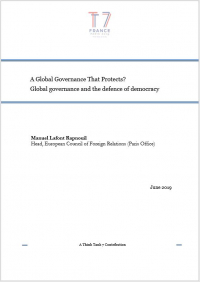Gateway to Think Tanks
| 来源类型 | Publications - External Publications - External Articles |
| 规范类型 | 其他 |
| A Global Governance That Protects? Global governance and the defence of democracy A Think Tank 7 Contribution | |
| Manuel LAFONT RAPNOUIL | |
| 发表日期 | 2019-08-23 |
| 出版年 | 2019 |
| 概述 | Global governance emerged to deal with the gap between the plurality and diversity of states and the collective and transnational nature of increasingly complex global affairs. |
| 摘要 |
A Global Governance That Protects? Global governance and the defence of democracy A Think Tank 7 Contribution
Global governance emerged to deal with the gap between the plurality and diversity of states and the collective and transnational nature of increasingly complex global affairs.  The G7 played a key role in favouring the development of global governance. It was instrumental in pulling poor countries out of high indebtment, in fighting money laundering and terrorism financing, in preventing the spread of weapons of mass destruction, and in helping establish the Global Fund against AIDS, tuberculosis and malaria. It was also a place for informal discussions that helped unlock some disputes between major powers, as in 1999 over the status of Kosovo after NATO’s intervention. Against this backdrop, the group’s current difficulties, in terms of both clarity on its role as well as strategy and ability to reach consensus, are testimony to the broader challenges posed to global governance. The need for more effective global governance, and for a G7 able to play its role in that network, remains. Arguably, the gap between global challenges and global responses has even grown larger in the recent period. But by now, all should have realised that necessity is not enough. Slogans such as “we need global responses to global challenges” and “no power, including the major one, can address the current threats and risks alone” may be true. But they are not sufficient to solve the issues that impede collective action, and are likely not to sustain states’ willingness for international cooperation. Actually, interdependence itself has shifted from being a key driver of closer cooperation to being weaponised into great power competition. On the contrary, the many flaws of global governance and lack of states’ appetite to cooperate seem to steer powers in a different direction.
On the same topic
A Global Governance That Protects? Global governance and the defence of democracy
|
| 关键词 | Democracy G7 global governance Europe United States |
| URL | https://www.ifri.org/en/publications/publications-ifri/articles-ifri/global-governance-protects-global-governance-and |
| 来源智库 | French Institute of International Relations (France) |
| 资源类型 | 智库出版物 |
| 条目标识符 | http://119.78.100.153/handle/2XGU8XDN/416535 |
| 推荐引用方式 GB/T 7714 | Manuel LAFONT RAPNOUIL. A Global Governance That Protects? Global governance and the defence of democracy A Think Tank 7 Contribution. 2019. |
| 条目包含的文件 | ||||||
| 文件名称/大小 | 资源类型 | 版本类型 | 开放类型 | 使用许可 | ||
| t7-3.jpg(22KB) | 智库出版物 | 限制开放 | CC BY-NC-SA |  浏览 | ||
| t7_2019_discussion_p(465KB) | 智库出版物 | 限制开放 | CC BY-NC-SA | 浏览 | ||
除非特别说明,本系统中所有内容都受版权保护,并保留所有权利。